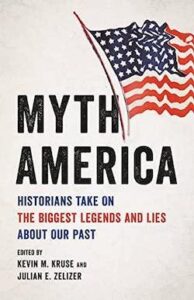 Summary: Historians take on mostly conservative talking points.
Summary: Historians take on mostly conservative talking points.
Historians have been having an internal battle about their public role in current events. Much of the discussion is framed around Presentism, which is “an attitude toward the past dominated by present-day attitudes and experiences.” Part of the reality of history as a social science is that interpretation is a necessary part of what it means to “do history.” I am not a historian, although I do read a lot of history and respect historians who are on different sides of this debate.
Myth America has two problems, and presentism is one of them. Kevin Kruze and Julian Zelizer are Myth America’s editors, both historians of recent American history. The last book I read from them was Fault Lines: A History of the United States Since 1974, which was worth reading, but the problem with recent history is that it is harder to have a broad perspective on that history because it is so recent. Most of the essays are framed around current myths about history that impact current politics, which is precisely the concern over presentism.
Carol Anderson’s chapter on voter fraud takes the concerns around the 2020 election and frames them historically about why we have a current concern about election fraud. That historical framing is helpful to see why we have a current obsession with voter fraud without any evidence of it actually being a problem in most elections. But the book’s very nature is mostly to address current political concerns, leaving the book open to critique of political bias.
The reality is that this is a left-leaning book because the editors are activist historians who believe that there is a role for historians to address politics. Not every chapter is overtly left-leaning, but discussing immigration, America First, American Exceptionalism, The New Deal, The Reagan Revolution, White Backlash to Civil Rights, Police Violence, The Southern Strategy, etc., are overwhelmingly left-leaning takes on history.
I am not calling for a both-sided type of book; I think this is a book worth reading as it is. But as a book trying to persuade, it falls short in drawing in moderate to conservative voters who believe many of the myths being discussed. There is a role for books that educate the left-leaning, but that isn’t primarily persuasion.
At the same time, I do think that part of the politicization of history also shows that some of these topics are now seen as highly political in ways that they would not have been 10 or 20 years ago.
Myth America: Historians Take On the Biggest Legends and Lies About Our Past Purchase Links: Paperback, Kindle Edition, Audible.com Audiobook